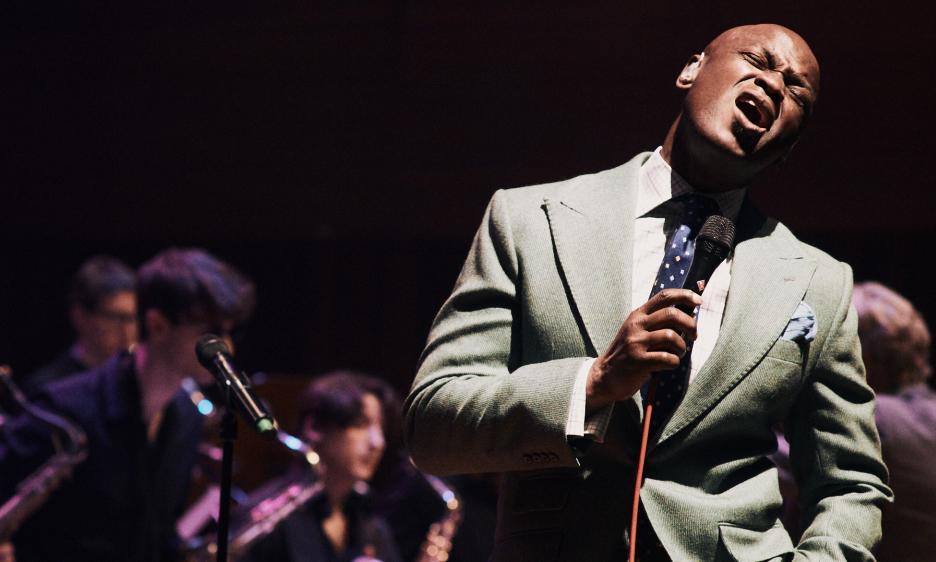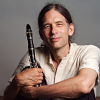Home » Jazz Articles » Interview » Ola Onabulé: A Tapestry of Soul, Jazz and Global Roots
Ola Onabulé: A Tapestry of Soul, Jazz and Global Roots

As a songwriter who strives to write with unflinching honesty, I try to present exactly who I am with all my inspirations, history, experiences, and influences on display.
—Ola Onabulé
Both based in London, the British-Nigerian vocalist and Swiss guitarist discovered, during the isolation of the pandemic, a shared empathy in their diverse backgrounds and musical passions. The result is a striking sonic tapestry, where Onabulé's powerful voice—spanning soul, jazz, and African roots—intertwines with Nicolas' versatile textures, grounded in other ethnic music traditions.
This collaboration marks over two decades of Onabulé's professional career. Jazz audiences know him for his performances with renowned orchestras and appearances at prestigious festivals. In this interview, Onabulé discusses his life between London and Lagos, the artists who shaped him, his musical passions and his work as a producer.
All About Jazz: Let's start with your 2025 album Proof of Life, a vibrant work with beautiful songs and fresh arrangements. Can you introduce it? How did the idea for the album come about?
Ola Onabulé: Proof of Life is really a duet album, a collaboration between myself and Swiss guitarist Nicolas Meier. We decided to write an album having spent some time in one another's company while recording my livestream during the pandemic. I noticed he had a very lyrical conversational style that seemed very much like an appropriate second voice to me. So, I thought it would be good to come up with some ideas and see where they took us.
AAJ: You mentioned that your musical connection with Meier felt immediate. What do you think lies at the heart of this connection, making it possible despite the remoteness of livestreaming?
OO: You're not wrong in considering livestreaming as "remote." But that's exactly what made it all the more acute: hearing how easy it was to have a musical conversation with Nicolas' playing despite being in a virtual setting. When you don't have the adrenaline, vibe and intensity of a live physical audience, it's great to still feel a visceral connection to what someone's saying with their instrument and a strong sense of them responding to you in the same way. If you can achieve that in the comparatively sterile environment of a livestream, it gives a strong sense of what potential there is to explore further. And that's what we did.
AAJ: Proof of Life brings together your African-rooted polyrhythms with Nicolas' Eastern and jazz influences. How did you balance these distinct musical identities to create a cohesive album?
OO: One would imagine that—theoretically—there is no middle ground between such diverse styles and genres, but this is what being brave about experimentation, exploration and improvisation opens one up to. It reveals hitherto unknown facts. Notions that may seem like absurdist theories, when considered hypothetically, can become solid definable facts when you overcome the challenge of looking at them honestly and analytically, without prejudice. This is what we discovered. We had no plan for what kind of album we were going to write. In fact, on our first writing session, Nicolas asked me if he ought to come prepared with some ideas and jotted notes, but I told him to leave all of that behind. I said "Let's just get in a room together—just you with your guitar and me with my microphone and Dictaphone—and let's make noise and see what happens." In those moments of melody, harmony, and rhythm, we discovered where the balance, tension, and pleasing aural chaos would create a middle ground between our very disparate influences and styles.
AAJ: Were there moments when those distinct cultural textures clashed, or did they always flow naturally into one another?
OO: I have to say there were absolutely no moments of clash! It truly was one of the most organic and enjoyable interactions I've ever had. The writing sessions were very easy indeed, and I found Nicolas' style of playing sympathetic and receptive to my vocal ideas, and vice versa. I know exactly what you mean, though. I've had musical interactions where there are barriers that can't be overcome.
AAJ: Can you select a specific song from the album to illustrate the creative exchange of ideas between you and Nicolas, describing how it evolved from initial sketch to final track?
OO: Definitely one such song would be the title track. Nicolas turned up with a very unusual instrument, the glissentar. It's a modern contemporary guitar derived from a traditional version of the instrument, making a very unusual sound typically rooted in the Turkish scale. So, I felt I should sing in a mode that was complementary and sympathetic to that style. This was a completely new and exciting area for me to explore. We arrived at a point in the tune where I felt the song needed a little bit of relief, like an oasis of sorts. I started humming this odd-time signature riff, quiet and mournful but African in feel. Amazingly, we felt it fit beautifully with the Turkish-centric groove Nicolas had initially presented. So, what I thought might at first-listen be incongruous worked beautifully. It wasn't straightforward—we had to apply our minds to it—but it turned out to be one of the songs I find most enjoyable to listen to on the album.
AAJ: Apart from the music, the songs in Proof of Life have compelling lyrics. Can you tell us how you approach writing lyrics and how that process interacts with the writing of the music? What aspects drove your inspiration?
OO: Lyric writing really is therapy for me. I don't tend to think too much about what I'm going to write, and I certainly don't try to contrive a topic to write about. I just tap into what I'm feeling about the world, myself, my life, my relationships, the people around me, and all the many stories I absorb from the news, family and friends. At the moment I'm conceiving or digesting a new melody, I often find that there are expressions and thought ideas that come with a certain lyrical or melodic pattern. They take shape as they evolve from hums and unintelligible murmurs into definable concepts and statements. Once I've captured them on a recording device, I can go back and listen later, delve into the deeper recesses of my mind, and try to figure out what I'm trying to say. What is my commentary? Is it about myself, a strength, a vulnerability, or a state of the world that I find troubling or inspiring? There are no limitations to what I choose to write about. I just try to keep myself open to all the suggestions buried deep in my subconscious.
AAJ: If every new album can be seen as a step forward in a musician's development and artistic quest, what does Proof of Life achieve compared to your previous albums and, more generally, to your entire discography?
OO: I think I'd probably forgotten a part of myself in the recording of the last album. The new album allowed me to rediscover a more personal emotional aspect to who I am, rather than a wider analysis or critique of society at large.
AAJ: You've worked with big bands and orchestras. Is there something from those experiences that you take with you when you face more stripped-down projects like Proof of Life? Conversely, is there anything you try to bring from your more intimate projects into your collaborations with large ensembles?
OO: Having the ability to work with large ensembles is a very lucky situation to find oneself in. There aren't that many big bands and orchestras to work with, so one is always interspersing big ensemble work with gigs with trios, quartets, and quintets. I've gone sometimes from a 70-piece philharmonic to a trio gig, and I'm used to switching it up. I enjoy the challenge of adapting to whatever is required for the specific situation I find myself in.
AAJ: Throughout your discography, you bridge jazz, soul, and African influences. Do you see Proof of Life as a continuation of that journey?
OO: Absolutely! My life is multi-various in its influences and in the particularities of my story. Born in London, raised in Nigeria, educated in the English countryside, married to a Mediterranean. Lucky enough to have traveled all over the world. As a songwriter who strives to write with unflinching honesty, I try to present exactly who I am with all my inspirations, history, experiences, and influences on display.
AAJ: Besides music, what are the most important things in your life?
OO: I'm a family man—it's probably the thing that defines me most.
AAJ: What are the greatest musical and non-musical influences in your artistic development?
OO: The biggest non-musical influence on my music is my father, who had great emotional intelligence. He was quiet and very wise, with an incredible ability to listen and adjudicate with unwavering fairness. He was a careful listener with an admirable ability for empathy. My biggest musical influences were the people who populated the radio stations in my earliest years: The Beatles, Stevie Wonder, Marvin Gaye, Aretha Franklin, Donny Hathaway. Then, when we moved to Nigeria, it was Fela Kuti, Manu Dibango, Miriam Makeba, Bobby Benson, E.T. Mensah, Haruna Ishola, and many more. When I came back to the UK, I discovered George Benson, Al Jarreau, Wes Montgomery, Miles Davis, Dizzy Gillespie, Steely Dan, Michael McDonald, Gino Vannelli, Nina Simone and many more.
AAJ: How do those influences manifest themselves in Proof of Life?
OO: They're there—they're always there! You can't get away from your influences! In my opinion, the only way out is to listen to everything you love, a lot, and then find a way to let your authentic self be the expressor of your unique jumble of influences while trying to add something new to the music. I feel that art is generally evolutionary rather than revolutionary.
AAJ: In this album, I noticed for the first time some similarities with the work of Al Jarreau. Is that just an impression of mine, something you also see, or perhaps something you undertook deliberately?
OO: It's not a mistaken impression at all! More than any other singer, I am mostly compared to Al Jarreau. It might have something to do with the fact that I love to improvise and interact with musicians. I find myself in this middle ground where my pop, soul, funk and African sensibilities are always locked into a relationship with my jazz leanings, pretty much in the way Al Jarreau did. Also, I listened to a hell of a lot of his music when I was at university!
AAJ: How do live performances and studio work compare? How do you prepare for each?
OO: I absolutely love studio days. I'm a complete tech geek. I've built a few studios over the years, and I'm never happier than when I'm surrounded by studio gear and technical magazines! It's just about the most exciting part of being a musician for me, other than the moment when you step out onto a stage—that exciting and powerful moment when you meet your audience for the first time that night! Funny enough, I'm essentially an introvert, but when I walk out onto a stage and see all those people, this other persona takes over—one that enjoys the interaction and the sense of community. I love the almost primeval tradition of surrendering ourselves to sound in the way we've been doing since we were cavemen. It's endlessly fascinating.
AAJ: Working out of your Casa Del Funk Studios gives you full creative control. How do you balance that freedom with the collaborative nature of projects like Proof of Life?
OO: It's something I really need to work on. I can get stuck into playing with all my studio toys from early in the morning to the early hours of the next morning, stopping only for food and water. When I'm writing an album, I create these very complex and detailed demos, but when it's time to record, I don't give the musicians any direction. I make sure the demo is the last word I say on how the music should sound. From that point on, it becomes a very collaborative process. I'm always interested to see how they interpret my ideas, and that's quite enjoyable for me—something I'd recommend to anyone who is almost always working alone. It allows some breathing space between your initial ideas and how they are interpreted by a talented group of people.
AAJ: Your vocal range and control are extraordinary. How did your vocal technique evolve over time as a result of your experiences and maturation?
OO: Time, experience and maturity are the essential ingredients to ending up with a voice that's a workable instrument in the studio and on stage. Although I've never really taken any vocal lessons, I warm up and sing every day, do scales for at least an hour, and tackle songs that are challenging and out of my repertoire in any genre. They can be classical, jazz, Brazilian, or whatever, as long as I'm pushing myself beyond my known limits. I make sure I explore all the areas of what the human voice can do so that when I'm on stage, I can make any sound I imagine—from gentle and sophisticated to rebel animalistic roars—without damaging my voice.
AAJ: Among the many albums you have recorded, do you have any favorites?
OO: Oh, that's a very difficult question to answer! There are different songs on different albums that I feel I got as close as possible to the idea in my imagination as I wanted. Nonetheless, anything that previously existed in your imagination will never meet up to how you imagined it once it's finished... maybe that's why I keep going back for more! The album prior to Proof of Life, Point Less, was a concept album. I assigned myself the challenge of writing songs around one theme but from the different perspectives of the various people involved in the story I was telling. I feel I met that challenge reasonably well, and that gives me a sense of having achieved something... but having said that, I think Proof of Life might be my most mature work as a producer. I approached the album in a way that I hadn't done before, which made me feel like I was growing as a producer... so yes, a very hard question to answer!
AAJ: Where will your artistic trajectory take you after Proof of Life?
OO: I have a big band project that I'm currently working on with the Latvian Radio Big Band. I also have another project with two brothers from the US, the Hazelrigg Brothers. We've just completed recording an album together, quite unlike anything I've done before—entirely live, no edits. And finally, I'm working on my own next album of original works!
Tags
Interview
Ola Onabule
Angelo Leonardi
Nicolas Meier
The Beatles
Stevie Wonder
Marvin Gaye
Aretha Franklin
Donny Hathaway
Fela Kuti
Manu Dibango
Miriam Makeba
george benson
Al Jarreau
Wes Montgomery
Miles Davis
Dizzy Gillespie
steely dan
Michael McDonald
Gino Vannelli
Nina Simone
PREVIOUS / NEXT
Support All About Jazz
 All About Jazz has been a pillar of jazz since 1995, championing it as an art form and, more importantly, supporting the musicians who make it. Our enduring commitment has made "AAJ" one of the most culturally important websites of its kind, read by hundreds of thousands of fans, musicians and industry figures every month.
All About Jazz has been a pillar of jazz since 1995, championing it as an art form and, more importantly, supporting the musicians who make it. Our enduring commitment has made "AAJ" one of the most culturally important websites of its kind, read by hundreds of thousands of fans, musicians and industry figures every month.





















